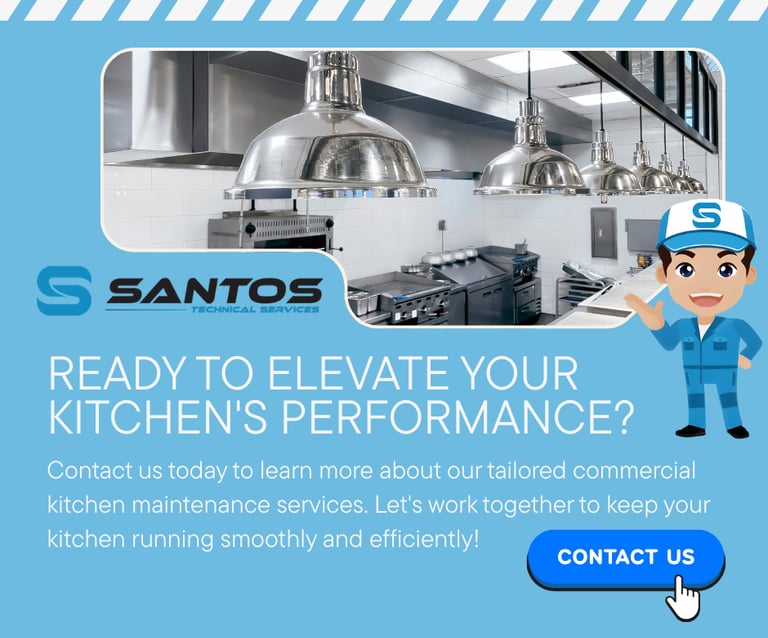Essential Guide to Commercial Kitchen Maintenance: Best Practices for Optimal Performance
As a restaurateur or kitchen manager, you might often hear about the critical role of commercial kitchen maintenance in ensuring a smooth-running food service operation.
Omar Montellato
5/21/20254 min read


Understanding Commercial Kitchen Maintenance
As a restaurateur or kitchen manager, you might often hear about the critical role of commercial kitchen maintenance in ensuring a smooth-running food service operation. But what exactly does this entail? At its core, commercial kitchen maintenance involves a series of regular inspections, cleaning, and servicing tasks designed to keep kitchen equipment in peak condition. These activities are crucial for enhancing the lifespan of kitchen appliances and ensuring food safety standards are consistently met.
To fully grasp the concept, it's essential to recognize that commercial kitchens are far more complex than their residential counterparts. They house a range of specialized equipment, each with specific maintenance needs. Without proper upkeep, these devices can quickly fall into disrepair, leading to costly repairs or replacements. Hence, understanding what commercial kitchen maintenance involves is the first step toward implementing a successful maintenance strategy.
Moreover, the complexity of commercial kitchen maintenance is compounded by the fact that it involves both preventative and corrective actions. Preventative maintenance focuses on regular checks and cleaning to avert equipment failure, while corrective maintenance addresses any issues that arise unexpectedly. Together, these efforts ensure that your kitchen operates smoothly, with minimal disruptions to service.
Importance of Regular Commercial Kitchen Equipment Maintenance
Regular maintenance of commercial kitchen equipment is not merely a best practice—it's a necessity. Consistent upkeep allows us to prevent equipment malfunctions that could disrupt service and compromise food quality. Regular maintenance ensures that appliances like ovens, refrigerators, and dishwashers function efficiently, reducing energy consumption and operational costs over time.
Another significant advantage of routine equipment maintenance is safety. In a bustling kitchen environment, the risk of accidents can be high. Things like gas leaks from stoves, electrical faults in ovens, or malfunctioning refrigeration units can present severe safety hazards. By adhering to a regular maintenance schedule, we can identify and rectify potential issues before they escalate into dangerous situations
Lastly, regular maintenance positively impacts the bottom line. By prolonging the life of equipment and minimizing unexpected breakdowns, we can avoid the high costs associated with emergency repairs and equipment replacements. Additionally, well-maintained appliances are more energy-efficient, leading to reduced utility bills. By investing in regular maintenance, we are effectively safeguarding our business's financial health.
Key Components of Commercial Kitchen Maintenance
Maintaining a commercial kitchen involves several key components that must be addressed routinely. Understanding these elements can help us establish a comprehensive maintenance plan that covers all bases. Below are the primary components involved:
Equipment Inspection and Cleaning: This involves meticulous checking and cleaning of all kitchen appliances. Ensuring that equipment is free of grease and debris not only improves efficiency but also prevents fire hazards. Regular inspections help identify wear and tear early, allowing for timely repairs.
HVAC Systems Maintenance: A well-functioning HVAC system is crucial in a commercial kitchen to manage heat and ventilation. Regular checks and cleaning of air filters and ducts ensure a safe and comfortable working environment. Proper ventilation also helps in maintaining air quality, essential for both staff health and compliance with health regulations.
Plumbing and Drainage: Efficient plumbing systems are vital for drainage and water supply. Regularly inspecting pipes and drains for leaks or blockages is crucial to avoid water-related issues. Proper waste management and drainage systems prevent any potential hygiene issues that could arise from stagnant water or waste buildup.
By addressing these components, we can create a robust maintenance plan that ensures our commercial kitchen remains in optimal condition, thereby supporting uninterrupted operations and adherence to safety regulations.
Best Practices for Maintaining Commercial Kitchen Equipment
Implementing best practices in commercial kitchen equipment maintenance can significantly boost the efficiency and longevity of your appliances. Based on industry standards and expert recommendations, here are some practices to consider:
Develop a Maintenance Schedule: Establishing a consistent maintenance routine is critical. A well-structured schedule should outline daily, weekly, and monthly tasks for each piece of equipment. This approach ensures that nothing is overlooked and maintenance is performed regularly.
Training and Staff Involvement: Educating staff on proper equipment usage and basic troubleshooting can prevent many issues from arising. Staff should be trained to recognize signs of malfunction and perform minor maintenance tasks, such as cleaning and checking for wear.
Engage Professional Services: While daily maintenance can be handled internally, engaging professional commercial kitchen maintenance services for periodic deep cleaning and technical inspections is advisable. Professionals have the expertise to perform thorough checks and repairs that might be beyond the in-house team's capabilities.
The implementation of these best practices not only ensures the smooth operation of kitchen equipment but also promotes a culture of responsibility and awareness among staff, all contributing to the overall success of the business.
Conclusion: Ensuring Optimal Performance in Your Commercial Kitchen
In conclusion, maintaining a commercial kitchen is a multifaceted task that requires strategic planning and consistent execution. By understanding the intricacies of commercial kitchen maintenance, we can appreciate its vital role in sustaining efficient operations, ensuring safety, and protecting our financial investments.
Regular commercial kitchen equipment maintenance is non-negotiable for any food service establishment aiming for excellence. Through a combination of routine inspections, staff training, and professional services, we can prevent costly disruptions and uphold high standards of food safety and quality.
Ultimately, investing time and resources into commercial kitchen maintenance is an investment in the future success of your business. For those looking to enhance their maintenance strategies, consider partnering with reputable commercial kitchen maintenance services that can offer tailored solutions to meet your specific needs. By doing so, you ensure your kitchen's optimal performance, allowing your culinary creations to shine.
Santos Technical Services
Your Trusted Partner for Commercial Kitchen Equipment, Air Conditioning, and Refrigeration Solutions!
contact INFO
Subscribe to Our Updates
+1 (561) 303 4654
© 2025. All rights reserved.
918 Clint Moore Rd Boca Raton - FL33487



